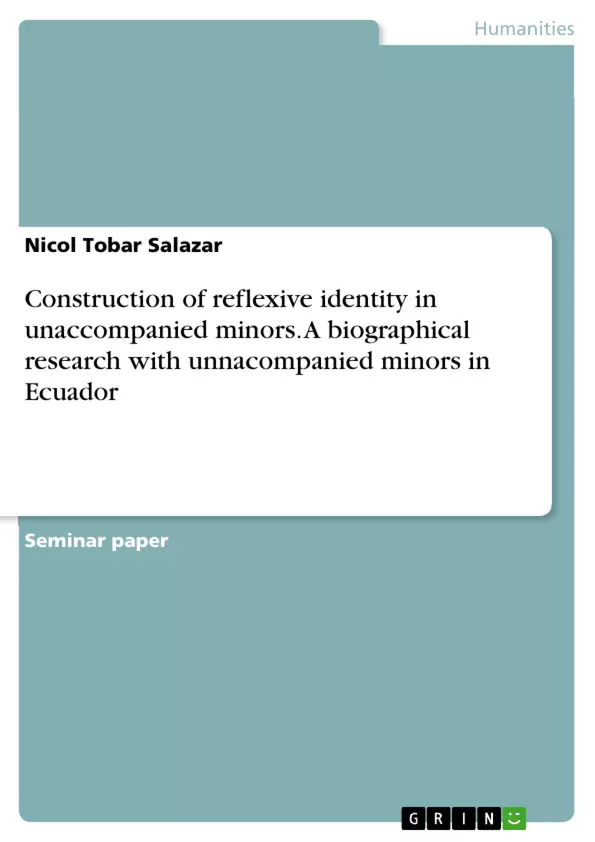The categories per se of the "oneself" and the "self-identity" have been [re]defined and [re]interpreted by every culture, in many diverse forms according to their particular constructions, paradigms, ideals and values. The present research attempts to focus not solely in the regular process of reflexivity in a particular stage of live, but even more specifically in the living circumstances of unaccompanied youngsters with migration background. Children under legal majority age, forced to flee their country of origin independently or separated from the adult members of their families, due to personal threats, humanitarian crises, persecution, systematic violence or extreme poverty. It begins from a macro conceptual review in the field, of the relevant reflectivity theories. Among them, the classic Symbolic Interactionist theories. Finally, it intends to outline conclusions in the matter of reflexive identity as a topic which is never too early to approach from the standpoint of the youngsters themselves.
Inhaltsverzeichnis (Table of Contents)
- Abstract
- Introduction: Identity in times of crises
- Methods and materials used
- Results
- Discussion
Zielsetzung und Themenschwerpunkte (Objectives and Key Themes)
This research explores the process of reflexive identity construction in unaccompanied minors with migration backgrounds. It examines how these young people, forced to flee their homes due to various crises, develop a sense of self. The study draws upon relevant theories of reflexivity, particularly Symbolic Interactionism, to analyze the challenges and complexities of identity formation in this vulnerable population.
- Reflexive Identity Formation in Unaccompanied Minors
- The Impact of Migration and Crisis on Identity Development
- Symbolic Interactionism and Identity Construction
- The Role of Social Context in Shaping Self-Perception
- Developmental Stages and Identity Crises
Zusammenfassung der Kapitel (Chapter Summaries)
Abstract: This research investigates the multifaceted process of reflexive identity formation within the unique context of unaccompanied minors who have migrated. It challenges traditional views on identity development, acknowledging the diverse ways cultures define self and identity. The study focuses on the lived experiences of these children, considering the impact of factors such as personal threats, humanitarian crises, and extreme poverty on their sense of self.
Introduction: Identity in times of crises: The introduction delves into the complex and enduring human quest for self-understanding. It explores the interplay between individual self-perception and societal influence, referencing key sociological theories like Symbolic Interactionism. The chapter establishes the reciprocal relationship between the self and society, highlighting the concept of reflexivity as central to selfhood. The discussion incorporates the contributions of prominent scholars like Stryker, Cerulo, McCall and Simmons, and examines how sociological perspectives contrast with psychological viewpoints on identity. Key concepts such as the "looking-glass self" and the development of self-concept are introduced, laying the groundwork for the study's exploration of identity formation in unaccompanied minors.
Schlüsselwörter (Keywords)
Self-concept, reflexive identity, reflexivity, unaccompanied minors, migration, identity crisis, symbolic interactionism, social context, childhood studies, children's rights.
Frequently asked questions
What is the main topic of this document?
This document is a language preview of research exploring reflexive identity construction in unaccompanied minors with migration backgrounds, focusing on how these young people develop a sense of self amidst crises.
What are the key themes explored in the research?
The key themes include reflexive identity formation in unaccompanied minors, the impact of migration and crisis on identity development, symbolic interactionism and identity construction, the role of social context in shaping self-perception, and developmental stages and identity crises.
What are the chapters discussed in the document?
The document previews the abstract, introduction (identity in times of crises), methods and materials used, results, and discussion.
What does the introduction chapter focus on?
The introduction explores the complex quest for self-understanding, the interplay between individual self-perception and societal influence, the reciprocal relationship between self and society, and the concept of reflexivity. It also introduces key sociological theories and concepts related to identity.
What is the abstract about?
The abstract investigates the multifaceted process of reflexive identity formation within the context of unaccompanied minors who have migrated, challenging traditional views on identity development and focusing on lived experiences shaped by personal threats, humanitarian crises, and extreme poverty.
What are the key words associated with this research?
The keywords are self-concept, reflexive identity, reflexivity, unaccompanied minors, migration, identity crisis, symbolic interactionism, social context, childhood studies, and children's rights.
What theoretical framework does the research draw upon?
The research draws upon theories of reflexivity, particularly Symbolic Interactionism, to analyze the challenges and complexities of identity formation in this vulnerable population.
- Quote paper
- Nicol Tobar Salazar (Author), 2020, Construction of reflexive identity in unaccompanied minors. A biographical research with unnacompanied minors in Ecuador, Munich, GRIN Verlag, https://www.hausarbeiten.de/document/1521635


